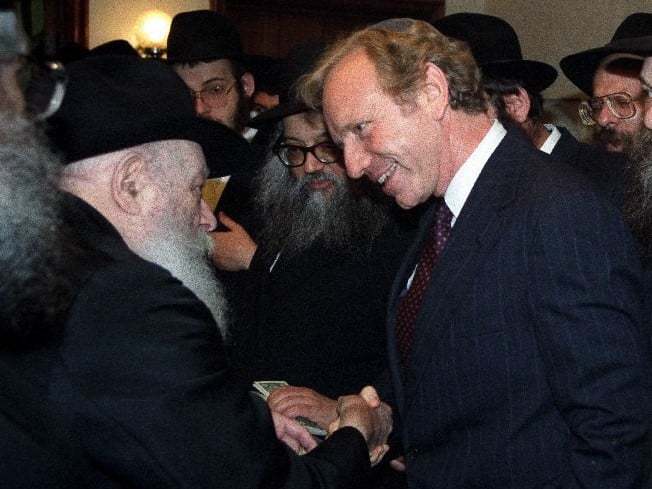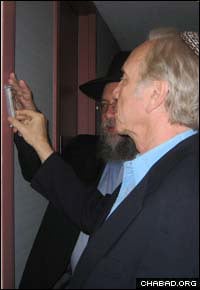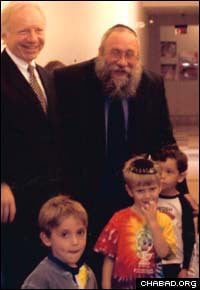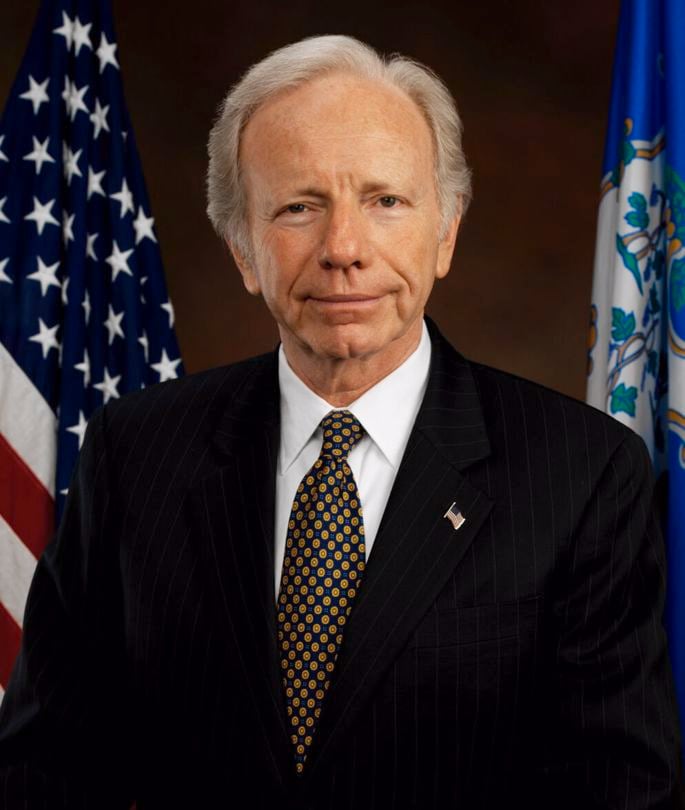
Joseph Lieberman, 82, U.S. Senator, Vice-Presidential Nominee, and Proud Jew
by Eli Rubin and Dovid Margolin – chabad.org
If there is one word with which Joe Lieberman’s name is most associated, it is the Jewish day of rest: Shabbat.
Lieberman, who faithfully observed Shabbat throughout his high-profile political career, passed away on March 27. He served four terms as U.S. senator from Connecticut, and in 2000 was nominated for vice-president on the Democratic Party ticket, becoming the first Jewish candidate to represent a national party platform. In the critical fall weeks before the election, Lieberman let it be known that on Rosh Hashanah, Yom Kippur, Sukkot, and Simchat Torah, he would not be on the campaign trail, but in the synagogue.1
In 2011, towards the end of his fourth term in the Senate, Lieberman published his seventh book, titled The Gift of Rest: Rediscovering the Beauty of the Sabbath.
Shabbat observance and synagogue attendance were only the most public dimensions of his commitment to Jewish life and practice. Lieberman kept kosher, laid tefillin every weekday morning, prayed three times daily, and regularly studied the weekly Torah portion. He became acquainted with the Rebbe—Rabbi Menachem M. Schneerson—of righteous memory while still in college and maintained a strong relationship with the Rebbe and with the Chabad-Lubavitch movement for the rest of his life.
Lieberman was first elected to the Senate in 1988, scoring an upset victory over Lowell Weicker. On his way to Washington, D.C., to take the oath of office, Lieberman stopped in Brooklyn, N.Y., to receive a blessing from the Rebbe.
“I saw your picture in the paper,” the Rebbe told him. “May G‑d Almighty bless you to be successful in your new position and to be a source of pride for the Jewish people in general.”
“Thank you, Rebbe,” Lieberman replied. “I’m going to try my best … It’s a great opportunity and a great responsibility to do whatever I can to sanctify G‑d’s name.”
An Early Stand for Shabbat
Joseph Isadore (Yosef Yisrael) Leiberman was born on Feb. 24, 1942, and grew up in an observant Jewish home in Stamford, Connecticut. His parents, Henry (Chanan) and Marcia (Masha), were both born in the United States to Jewish parents who had emigrated from Poland and Austria in the early 1900s.
When Joe was growing up in the 1940s and `50s, the Liebermans were among the only—perhaps the only—Shabbat-observant young families in Stamford, said Rabbi Yisrael Deren, a longtime family friend who, with his wife Vivi, established Chabad of Stamford in 1988. On Shabbat afternoons in the summer, when most neighborhood children would go down to the beach to swim, Marcia Lieberman would prepare games and refreshments in her home and invite the Jewish kids over so that they, too, could keep Shabbat.
“Maybe she didn’t call it that, but she made a ‘Mesibos Shabbos’ program in her house and made it the place to be on Shabbat afternoon,” said Rabbi Deren. “We were not the first shluchim in Stamford. Joe’s mother was.”
The environment rubbed off on Joe. In his senior year of high school, he was elected prom king, but because the prom was held on Shabbat he chose to forgo the honor and stick to his religious commitments instead.

His maternal grandmother, Minnie (“Maintza” in Yiddish) Manger, was an important presence in young Joe’s early life. She had carried the legacy of traditional Jewish life across the ocean from Europe, and he described her as “the religious foundation of our home.” In Poland, she had been persecuted for her religion, but in America she was respected for her observance. Thus, in addition to being a proud Jew, she became a proud American too.
When she passed away, in 1967, her grandson decided that he would emulate and perpetuate her legacy in his own life. With her very last words, he recalled, she conveyed her love for Shabbat. “If I let go of the link in the chain,” he reasoned, “it would be broken and lost to me and my children after me.”
While speaking of his grandmother in a 2021 interview, Lieberman was reminded of a Yiddish statement by the Sixth Lubavitcher Rebbe—Rabbi Yosef Y. Schneersohn, of righteous memory—“America iz nisht andersh – America is no different.” “Yes,” he reflected, “you can be a Jew here.”2
“He impacted a generation of young American Jews,” said Deren. “Whenever he spoke in schools, to groups, he’d tell them not only is there no contradiction between Torah and mitzvot and public life, but that such commitment was an advantage, something Americans respected you for.”
Yale, and a First Encounter with the Rebbe
In 1960, Lieberman entered Yale University. There he was taken under the wing of New Haven Jewish community activist William Horowitz, who was appointed the first Jewish trustee of Yale in 1965. Horowitz, Lieberman recalled, “was quite fascinated by the Rebbe, and by the Lubavitch movement, generally.” It was Horowitz who first took Leiberman along for a visit to the Rebbe’s synagogue at 770 Eastern Parkway in the Crown Heights section of Brooklyn. (The second guest, it should be noted, was Yale’s then-chaplain William Sloane Coffin.)
“It was Simchat Torah … we went to 770, and saw not just the normal fervor and excitement … but the special, extra spiritual dimension of Simchat Torah,” Lieberman recalled. He described this encounter as “a phenomenal experience,” which helped to solidify his own commitment to his Jewish identity. On that occasion, he was one member of a vast crowd. But he would later establish a personal connection with the Rebbe, corresponding with him and interacting with him in person.
Over the course of his storied political career, he traveled across the United States and the world, and developed warm relationships with many Chabad representatives and institutions, in his words in The Gift of Rest, “from Budapest to Beijing, and from Taipei to Tashkent … .”
Of his first face-to-face encounter with the Rebbe, Lieberman said, “of course, his eyes were very compelling, so I remember the moment.” He raised a small glass of wine, and the Rebbe wished him “L’chaim!” (“to life!”).
Lieberman cherished the opportunities he had to visit 770 and listen to the Rebbe teach at his legendary farbrengens, which often lasted many hours. He came back “over and over again,” and found himself “deeply impressed by the spirituality, the extraordinary scholarship of the Rebbe, by the devotion and attentiveness of the Chassidim there, and by their joy.” As the evening got later, Lieberman added, he could only marvel “at the intellectual and physical energy and stamina of the Rebbe, who continued to bring out of himself, essentially, as I could see, without [reference to] a note, the most deeply spiritual and profound insights.”

At a 1995 event held in Washington on the first anniversary of the Rebbe’s passing, Lieberman recalled those farbrengens in 770, holding a small cup of wine in his hand and hoping to catch the Rebbe’s eye for a moment. “That’s what it feels like now,” Lieberman told the crowd. “We all want to do things to catch the Rebbe’s eye.”
At Yale, Lieberman formed another important friendship that would eventually strengthen his bond with Chabad. His roommate was Richard Sugarman, who began his own journey to Jewish observance after accepting an invitation to spend the High Holidays at the Lieberman family home in Stamford. Sugerman—who has been a Professor of Philosophy and Religion at the University of Vermont since the early 1970s—ultimately became a Chabad Chassid and also a close friend of Bernie Sanders, the senior U.S. senator from Vermont.
A Path of Public Service
After earning a law degree and working briefly as a lawyer, Lieberman was elected to the Connecticut Senate in 1970. At this point he received a letter from the Rebbe, which he described as “a brief dissertation” on the exhortation of the prophet Jeremiah (29:7) to “seek the peace of the city” wherein you dwell “for in its peace you shall have peace.” For a young man “beginning a career of public service,” Lieberman later recalled, “it was a very, very, powerful message,” which he came to see as expressing the fundamental ethos of Chabad as a movement. In Lieberman’s words:
“It is a Jewish movement, but it is a movement that gives each of its inheritors a responsibility to carry the underlying principles and ethics, and action, of Torah, out to the world—acts of kindness, acts of justice, and the rule of law.”
After serving three terms as Majority Leader in the Connecticut Senate, Lieberman held the office of Connecticut Attorney General from 1983 to 1989. Following his victorious bid for the U.S. Senate, he brought his entire family, including his elderly mother, to visit the Rebbe in Crown Heights.
As he later explained, “I went to him right before going to LaGuardia airport to take the shuttle to Washington … That was a Sunday afternoon, he was distributing the dollars for charity, and we spoke for a while, and I have a tape of that, which I cherish and look at very often. I appreciated, not only his blessing as I began this new chapter in life, but also the way he urged me on to make the most of it.” Lieberman was also impressed by the way the Rebbe took the time to speak to each member of his family, “with remarkable relevance,” saying “a little something special” to each one, “from my mother to our then youngest child, who was less than a year old.”
Rabbi Deren, who together with his wife would walk over to Marcia Lieberman’s home to make Havdalah after every Shabbat until her passing in 2005, noted that Joe was a loyal son who would call his mother every single day. She, naturally, was proud of him too.
“She’d say, ‘I’m very proud that I raised a son who became a U.S. Senator, but I’m even prouder that that son knew to go to the Rebbe for a blessing before he went to Washington.’ ”
Lieberman stood out in Washington for his religious convictions and for the integrity that was for him part and parcel of these beliefs. The cot he kept in his Senate office in case he’d need to sleep there overnight if a Friday vote went late became legendary. Once, in his early years in D.C., then-Senator Al Gore of Tennessee invited the Shabbat-observant Lieberman to stay over in his father’s comfortable apartment across the street. Gore insisted on accompanying him there so that he could turn on and off lights and make sure Lieberman was comfortable.

Lieberman’s Shabbat observance came onto the national stage in 2000, when by-then Vice President Gore chose him as his running mate. In his Gift of Rest, Lieberman recalls one particularly memorable Shabbat dinner that he and his wife, Hadassah, spent with the Gores during the hotly contested election recount.
“When we were done and it was time to leave, Al asked if we were going to walk home,” Lieberman wrote. “We said yes, and he and Tipper said they would accompany us. We resisted; but they persisted; and so on that beautiful December night, the four of us—with the Secret Service discreetly walking behind and security cars ahead and behind—walked … to our house” a little more than a mile away.
Kosher food was likewise something the entire D.C. establishment came to learn about. Once, Lieberman and a Jewish congressman found themselves having lunch on Air Force One with President Bill Clinton. The congressman joked that there were now two sandwiches for him because Joe wouldn’t touch his. “What do you mean,” Clinton shot back, “we have special sandwiches for Joe!”
And then there was prayer. In the 1990s, Lieberman recalled in another anecdote shared in The Gift of Rest, he and the late Sen. John McCain were on a plane headed to Bosnia to visit U.S. troops there. As the morning sunlight dawned, Lieberman arose and donned tallit and tefillin to recite morning prayers.
“I noticed John open his eyes for a moment and look at me, then close them again,” Lieberman wrote. “Then, doing a double take, his eyes opened wide.”
“Where am I? What is going on!” the Arizona Republican blurted out.
“Johnny,” Lieberman replied, “I’m just saying my morning prayers,” before briefly explaining what they were.
“Oh good,” McCain cried with relief, “for a moment there, Joey, I thought I’d died and gone to heaven.”
“I remember a Jewish friend of ours owned a department store in a very non-Jewish rural Connecticut town,” said Rabbi Deren. It was election season, and during a casual conversation with his non-Jewish employees, the subject of who they were voting for came up. “Each one said ‘Lieberman.’ When our friend asked them why, they said ‘A man who skips his own nominating convention [on Shabbat] because of his principles is a person we can trust.’ ”

Lessons in Leadership
In 1995, the Rebbe was awarded a Congressional Gold Medal. Lieberman was among the speakers at the celebratory breakfast marking the occasion. “The Rebbe,” he said, “doesn’t need this medal, but America—through its elected representatives—needed to award this medal to the Lubavitcher Rebbe because of what he means to the American Jewish community and to America generally … The Rebbe took the Torah and brought it down to earth for us, and taught us how to incorporate it within ourselves.”
In 2009, Lieberman marked the 15th anniversary of the Rebbe’s passing at a Philadelphia event organized by American Friends of Lubavitch (Chabad). He spoke of how, as a young man, he had found himself “entranced” by “with the fervor, with the spirit, with the sense of purpose” that the Rebbe exuded, and that he was “impressed by his obvious spiritually, by his soaring intellect, by the extent to which he was involved in the world.” The Rebbe, he continued, was “rooted in the Torah, going back to Mt. Sinai,” but was at the same time “involved in the world of today.”
Lieberman noted that the Rebbe displayed great awareness and knowledge of “all the most remarkable technological, psychological, political and medical developments of his lifetime, and spoke to them.” He found the Rebbe, and his emissaries, to be “the most open-minded and accessible of Jewish leaders” providing “the conscience, voice, and guidance for our time.”
In 2013, shortly after concluding his final term in U.S. Senate, Lieberman delivered a keynote address to the International Conference of Chabad Emissaries. On that occasion he spoke of the miraculous salvation of the Rebbe from the Nazis, and of his tremendous achievements as a scholar, teacher, and a leader: “He was a great teacher and a great leader. He was a great theological leader … He built the core of a following, but was constantly reaching out, and pushing his Chassidim to reach out. At the heart of it all was spirituality and a tremendous intellect.”
Lieberman also took the opportunity to “thank all the shluchim … so many of whom have been so good to me as I traveled the country and the world,” together with “their supporters, without whom they could not do the extraordinary work that they do.” But he singled out a few emissaries in particular with whom he had close relationships that lasted over many years. There was, of course, Rabbi Deren from Stamford, whom he often called his “brother,” as well as Rabbi Avraham Shemtov of Philadelphia, and Rabbi Levi Shemtov of Washington D.C., whom, in an interview with Chabad.org, he referred to as “the Secretaries of State of Chabad.”
“The Rebbe,” he said, “was a leader with a mission to spiritualize the world, to convince people, through acts of kindness and goodness, to bring the world as close as we possibly could, in our time, to perfection—and to do it one by one, mitzvah by mitzvah … until that time when the world is filled with the knowledge of the Lord.”
Joseph Lieberman’s first marriage to Betty Haas ended in divorce in 1982. He is survived by their children Matthew and Rebecca. He is also survived by his wife, Hadassah; their daughter, Hana; his stepson, Ethan; two sisters; and many grandchildren.












